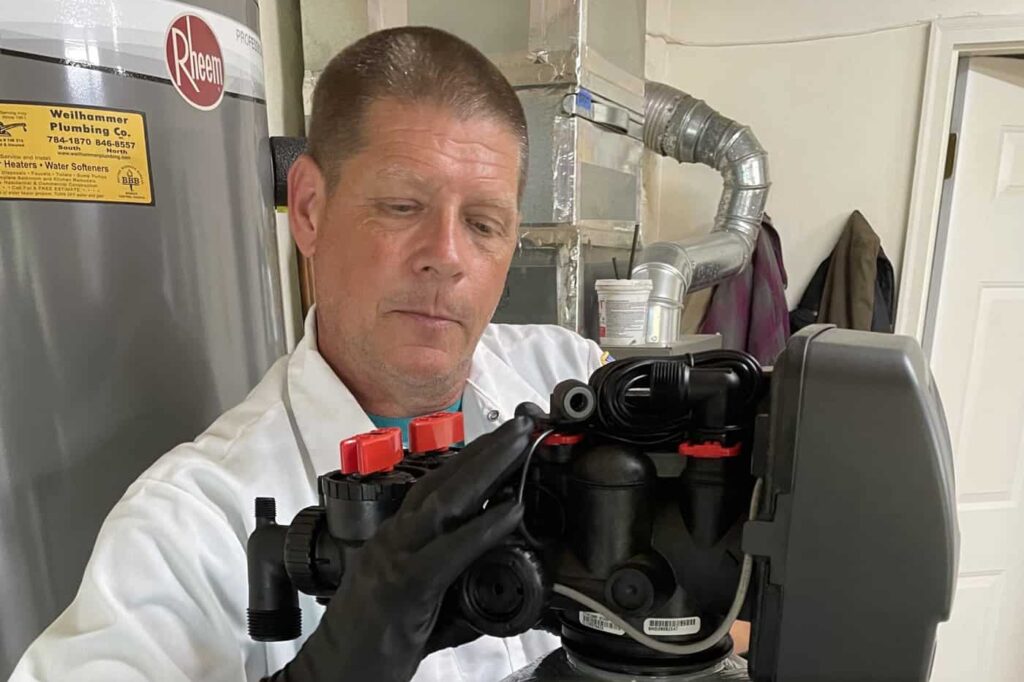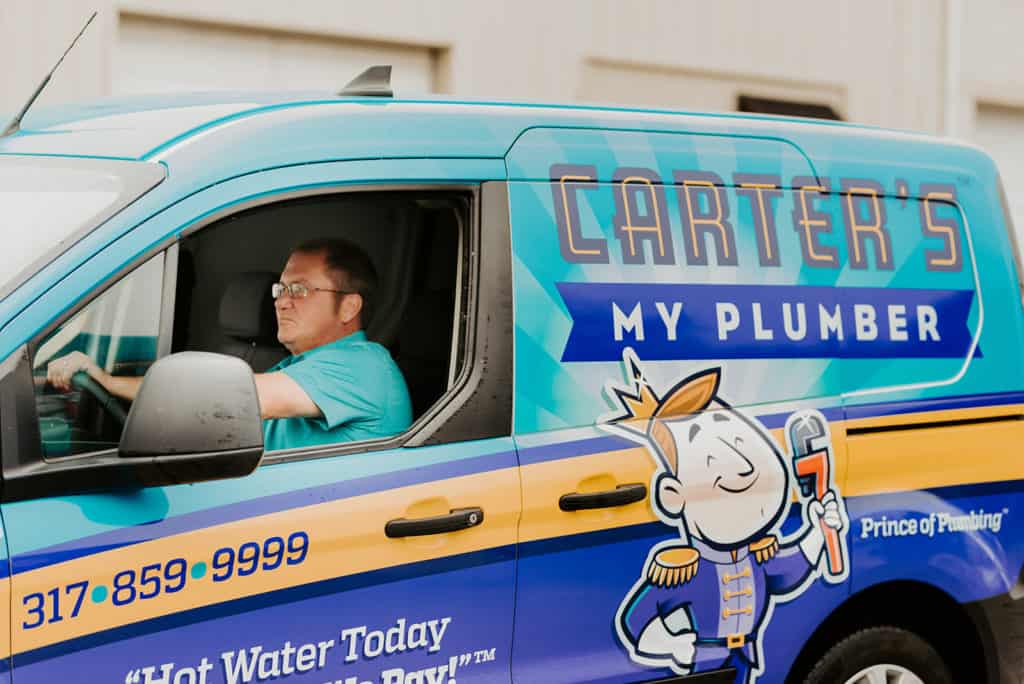Table of Contents
If you live in a part of the country where the water tends to be “hard” (that is, rich in mineral content), you may benefit from the installation of a water softener. Water softeners work by treating the water you use throughout your home, removing much of the mineral content and preventing scale buildup within your pipes. The benefits to the functionality of your plumbing systems and appliances can be profound, as can the benefits to your personal health and overall quality of life.
While a good water softener can potentially last you a good long while, sooner or later even the best plumbing equipment starts to exhibit signs of wear and tear. You’ll know there’s something wrong with your water softener when you observe a change to the taste of your tap water, spotting on your plates and silver, or changes to the amount of soap you need to use in your washing machine.
If you ever do experience issues with a water softener, make sure you have the problem diagnosed by a professional. Carter’s My Plumber is a trusted water softener company in Indianapolis, and we’re always happy to provide our diagnoses and recommendations.
For the purposes of this blog post, we simply want to highlight some of the problems that most commonly afflict water softeners. If you think you’re experiencing any of these issues, contact a professional plumber right away. The Carter’s team is always happy to restore your softener to full functionality, or to simply replace the unit as needed.

Common Problems with Water Softeners
With that said, here are a few of the most common issues that homeowners might experience with their water softener.
Insufficient Softening
If your water isn’t softening sufficiently, or it isn’t softening at all, that’s obviously a concern! There could be a number of reasons why this is happening, along with varying solutions.
- Your water softener settings are off. Your water softener should have a display where you can dictate when it “recharges.” If your unit is recharging while you’re trying to use water, then you won’t get the softening you need. Try setting it for sometime after-hours; many homeowners recharge around 2AM or 3AM, or whatever time your household isn’t running any plumbing appliances.
- You’ve got a salt bridge. Sometimes, your water softener will develop a “salt bridge,” which means a saline dome forms between the salt and the water itself. This creates an air pocket, which can prevent the recharging of the beads in your resin tank. You can check for a salt bridge by reaching into the tank with a broom handle. If you can reach to the bottom of the tank, you don’t have a salt bridge impeding your regeneration. If you do have a salt bridge, you can gently prod with the broom handle to break it up.
- There’s excess water in the brine tank. When you have too much water (or too little salt), it can compromise the regeneration of your brine. Check your water level (most units call for no more than 12 inches), and if there’s an excess, you probably want to call a professional plumber for help draining and resetting it.
- Your water softener is too old. How long do water softeners last? A good rule of thumb is that most units last around 15 years. If your unit is older than that and it’s giving you problems, it may be in your best interests to simply have a new one put in. We’re always happy to chat with you about the expected water softener installation cost.
Excessive Salt
One of the biggest expenses associated with a water softener is salt. You’ll need to add salt at regular intervals, and the price can add up… especially if you’re actually using more salt than you really need. Not only can excessive salt be expensive, but it can also compromise the proper functioning of your unit.
There are a number of factors that can lead to excessive salt use, including:
- Wasted water. If your household uses a lot of water, it will naturally trigger more frequent regeneration, which can in turn boost your unit’s salt content. You can’t always do much to address this, but being mindful of basic water conservation techniques (e.g., washing larger loads of laundry less frequently; always filling the dishwasher completely before you run it) might help.
- Unit size. The size of your water softener can also be a factor. If you have a unit that’s too big for your family’s needs, that could lead to excess salting. Ask your water softener installation company about identifying the most appropriately-sized unit.
- Increased water use. Something else to consider is that a big uptick in water usage will cause excessive salt use… so if you notice this, inspect your unit for a possible leak, particularly near the base. If there is a leak, contact a professional plumber to help you address it.
Issues with Regeneration
Still another possible issue is that your water softener won’t regenerate the way it’s supposed to. Without regeneration, your unit will quickly lose its ability to soften your water, which may result in the buildup of sediment.
There are a couple of common reasons for failed regeneration. The first thing you should check is for potential power failure. The issue may be something as simple as a loose wire, a broken switch, or a tripped circuit breaker. Be careful when dealing with electricity, and make sure you call an electrician if you have any concerns about safety. With that said, power issues are usually pretty simple fixes, and should get your water softener back up and running promptly.
The other possibility is that you have a motor issue. The motor runs automatically, shifting between regeneration and softening modes. When the motor fails, it won’t be able to alternate anymore, which is why your regeneration process might stall.
If you feel like your problem is motor-related, you’ll probably want to go ahead and call a plumber. However, you should also check your warranty information. If the motor is still under warranty, you may be able to get a free replacement.
Smelly or Discolored Water
Hopefully, your unit continually offers you good, clean, clear, soft water. Needless to say, if the water turns smelly or takes on an unusual color, such as water becomes yellow, that’s an obvious sign that something is off.
Again, there are a few possible culprits. One possibility is that you have iron and manganese sediment accumulating in your resin tank, compromising your salt levels and fouling your resin. The other possibility is that you have a bacterial buildup, which could be the result of eroding pipes or even an issue with the water main. Any of these issues can contribute to water issues, including dirty water.
You may need to clean out your tank, install a new filter, or address deeper issues with the pipes leading to your salt tank. No matter which course is needed, you’ll likely require the assistance of a trained plumber to address your brown water problem.
Blockages and Leaks
A final issue to consider is that you have a blockage or a leak. These problems can affect your bypass valve, drain hose, or the brine tank itself.
Leaks in Your Water Softener
If you notice a leak with your water softener, there are a few preliminary steps you’ll want to take right away, before you do anything else:
- Disconnect the unit from its power source. If the leaking is pretty significant, you may want to take the safe route of disconnecting it at the main breaker.
- Turn off the water supply to the softener.
- Look for the bypass valve, and push the button that says “push for bypass” (or something similar). The bypass switch will ensure you continue getting water in your household plumbing appliances.
From there, you’re ready to identify some potential sources of the leak. Here are a few of the most common:
- If your softener is leaking from the top, your issue is probably with the rotor valve. This valve serves as the source of water for the softener. If you have an older unit, this valve may crack and leak.
- You might also check the O-rings in your bypass valve. O-rings tend to last a while but they do need to be lubricated from time to time. And after 15 to 20 years, they will require replacement.
- If your softener is leaking from the bottom, the issue is likely with the brine tank itself. These leaks often happen due to overly aggressive efforts to clear out a salt bridge, so be careful!
- You may also have a hose problem, including a leak with the drain hose or the water softener hose.
If you have a leak that you can’t diagnose or don’t know how to fix, your best bet is always to call a professional plumbing company.
Water Softener Blockages
The other issue to consider is a blockage. A water softener can easily become clogged with salt, especially if weather conditions or humidity levels change. These factors can change the salt composition in your brine tank, causing the salt to congeal into a solid mass. This blocks water from passing through, which will effectively deprive your household of soft water.
Thankfully, these blockages are usually pretty easy to get rid of on your own, carefully using a broom to break them apart. Pouring in some hot water may also help to dissolve the salt build-up. Rarely do salt clogs require a professional plumber, but don’t hesitate to contact one as needed.

Calling a Professional Plumber to Address Your Water Softener Issues
While it is sometimes advisable to attempt a DIY water softener fix, it’s usually smarter to call a professional plumbing service.
DIY fixes put you at risk of damaging your unit, simply because water softeners are so complex. Even something as simple as breaking up a salt bridge with a broomstick can result in damage to the tank, resulting in a leak you may not be able to fix or control without simply replacing the entire unit. There are also potential safety concerns, especially if your problems involves electrical power.
By contrast, professional plumbing services have the skill and expertise needed to address your issues in a timely manner, ultimately saving you a lot of hassle while guaranteeing their quality of work.
Conclusion: Be Vigilant with Your Water Softener
Water softeners can improve your quality of life considerably, while also extending the lifespan of your pipes and plumbing appliances. They don’t last forever, but with regular maintenance, you can keep your softener up and running for a good many years. And if issues ever do arise, the best option is typically just to make a call to your local plumbing pro.
Frequently Asked Questions
What problems can a water softener cause?
While water softeners are generally good for your pipes and appliances, and can also have advantages for your personal health, they can be trouble for those who need a low-salt diet. Water softeners can also cause environmental damage due to excess salt discharge.
How many years does a water softener last?
The typical lifespan for a water softener is 15 years, though some units can last even longer if they are properly maintained.
What are signs that your water softener is going bad?
Some common hallmarks of a failing water softener are hard water, strange noises coming from the unit, or leaks from the top or bottom of the tank.
Why do water softeners stop working?
Water softeners may cease to function due to salt bridges and other forms or blockage, or because of motor failure. Power failure is another common concern.
Do water softeners run every night?
It depends on the household and on the unit, but generally water softeners need to regenerate once every day or two. It’s best to set this for a time when your family isn’t running water, which usually means in the night time when everyone is sleeping.
How often do you need to clean your water softener?
We recommend performing this water softener maintenance, getting rid of sediment build-up in the tank, at least once a year.
Do water softeners affect your health?
Water softeners can often have positive effects on your skin and hair, though salty water may be a problem for those who are particularly sensitive to sodium in their diet.
Does a water softener damage a washing machine?
When properly maintained, a softener should actually enhance the operation of your washing machine.
Can bacteria grow in a water softener?
This is technically possible, if you have certain types of minerals accumulate, though it’s fairly unlikely.






















